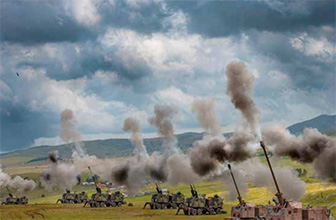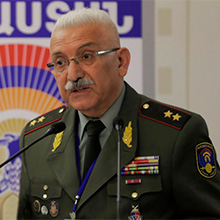
Armenia's June Elections May Lead to Further Uncertainty and Instability  By Benyamin Poghosyan, PhD, Chairman, Center for Political and Economic Strategic Studies
By Benyamin Poghosyan, PhD, Chairman, Center for Political and Economic Strategic Studies
Sunday's parliamentary elections in Armenia are hotly contested, and the electorate is actively engaged in the campaigning. But the election is likely to lead to further uncertainty and continued instability.
The official campaign for the 20 June 2021, early parliamentary elections in Armenia started on 7 June 2021. Twenty-five political entities are contesting the elections – 21 parties and four alliances (blocs). No election in the modern history of Armenia has seen such quantity and diversity of contenders. However, despite this impressive number, only a few participants have a real chance to overcome the threshold to enter Parliament – 5 percent for parties and 7 percent for alliances. READ MORE
- EGF Editor |
Published on EGF: 16.06.2021
| External Relations
-
Israeli-Greek Naval, Air Force and Defence Industry Cooperation  By Eugene Kogan, Tbilisi-based defence and security expert
By Eugene Kogan, Tbilisi-based defence and security expert
The bilateral Israeli-Greek military and defence industry cooperation was not created in a vacuum, but is a by-product of the steadily deteriorating Israeli-Turkish relations which include two important events: the famous World Economic Forum incident in Davos on January 29th, 2009 and the Mavi Marmara incident on May 31st, 2010. The Davos incident was further aggravated by the Mavi Marmara incident, which left ten Turkish citizens dead after clashing with Israeli commandos as the latter boarded the ship which was trying to break the Gaza blockade. Moreover, the military component of Israeli-Turkish relations, which used to be the backbone of the relations, is still missing and is unlikely to reappear in the near future. READ MORE.
- EGF Editor |
Published on EGF: 16.06.2021
| Security
-
Border Incident Forces Armenians to Rethink Relationship with Russia  By Benyamin Poghosyan, PhD, Chairman, Center for Political and Economic Strategic Studies
By Benyamin Poghosyan, PhD, Chairman, Center for Political and Economic Strategic Studies
The Azerbaijani military incursion into Armenian territory may have significant geopolitical implications. The muted reaction of the CSTO and Russia triggered another wave of anti-Russian sentiments in Armenia.
On 12 May 2021, news coming from the Syunik region shocked Armenian society. Several hundred Azerbaijani soldiers had crossed the Armenian border and penetrated up to 3.5 km into Armenian territory near the "Black Lake". The Armenian government did not confirm this immediately, however, late in the evening on the same day, Armenia’s Security Council convened in an extraordinary session, and the prime minister declared that Azerbaijani Armed forces had entered Armenian territory. READ MORE
- EGF Editor |
Published on EGF: 29.05.2021
| Security
-
Azerbaijan-Armenia Border Dispute – Could the Conflict Re-escalate?  By Fuad Shahbazov, Baku-based independent regional security and defence analyst
By Fuad Shahbazov, Baku-based independent regional security and defence analyst
Half a year after the Russian-brokered ceasefire agreement was signed between Azerbaijan and Armenia ending the 44-day war in Karabakh, peace in the complex region is not on the horizon. A new stage of discontent and harsh statements came last week after Azerbaijani Armed Forces reportedly crossed the border with Armenia in the Syunik province and advanced around 3 kilometres by Sev Lake. Yerevan dubbed this action as an explicit provocation and an attempt to occupy Armenian territory, whereas Baku denied the accusations, stating that Azerbaijani border guards established a military control point at the heights around the lake without advancing into Armenian territories. READ MORE
- EGF Editor |
Published on EGF: 21.05.2021
| Security
-
The Inexorable Drive for Socio-Political Reforms in Uzbekistan  By Eldor Tulyakov, Executive Director, Development Strategy Center, Tashkent
By Eldor Tulyakov, Executive Director, Development Strategy Center, Tashkent
In 2016, Uzbekistan's reform agenda's fresh and rather sudden trajectory focusing on political and socio-economic development brought a welcome surprise to much of the international community. Newly elected President, Shavkat Mirziyoyev, rapidly initiated policies based upon the principles of pragmatism and transparency — a shift well received by foreign governments, international organizations, and citizens alike and viewed as a watershed change in a country largely closed to the outside world since independence was obtained in 1991. A new vision of what will define Uzbekistan for future generations emerged, new horizons that will bring long-sought-after potential and opportunities to its people. READ MORE
- EGF Editor |
Published on EGF: 21.05.2021
| External Relations
-
Armenia and Azerbaijan Should Restore their United Nations Recognized Borders  By Lieutenant General (Ret.) Hayk Kotanjian, D.Sc., Full Professor (Strategic Security Studies)
By Lieutenant General (Ret.) Hayk Kotanjian, D.Sc., Full Professor (Strategic Security Studies)
The dynamics of the peace and war in the region surrounding Armenia attracts the keen attention of all actors promoting their international security interests in the explosive geostrategic space of the Greater Middle East.
In this context, the resolution of the border dispute in Syunik, and the issue of delimitation and demarcation of the borders between Azerbaijan and Armenia, which is the focus of international attention, requires academic and expert assessment of the legality to consider the current line of contact between the Armed Forces of the Republic of Armenia and the Republic of Azerbaijan as the starting point in the negotiations. The negotiating parties and the OSCE Minsk Group Co-Chair states - the Russian Federation, the United States and France - should take into account the evidence of the following internationally valid arguments. READ MORE
- EGF Editor |
Published on EGF: 19.05.2021
| External Relations
-
Big Armenian Decisions on Future Relations with Azerbaijan  By Benyamin Poghosyan, PhD, Chairman, Center for Political and Economic Strategic Studies
By Benyamin Poghosyan, PhD, Chairman, Center for Political and Economic Strategic Studies
Relations with Azerbaijan will be the key foreign policy issue faced by the new government, regardless of the outcome of the forthcoming parliamentary elections. Big decisions on future relations with Azerbaijan will have to be taken soon after the new Armenian government is formed after the 20 June elections.
On 10 May 2021, the Armenian Parliament did not elect a prime minister for the second time in a row. According to the Armenian constitution, Parliament was dissolved, and the President signed a decree to hold snap parliamentary elections on 20 June 2021. It is not easy to predict the precise results of the elections. However, we may assume that Armenia will not have a single-party government after the elections. READ MORE
- EGF Editor |
Published on EGF: 18.05.2021
| External Relations
-
Polish-Romanian Defence and Security Policy  By Eugene Kogan, Tbilisi-based defence and security expert
By Eugene Kogan, Tbilisi-based defence and security expert
A joint initiative of Romanian President Klaus Iohannis and Polish President Andrzej Duda, known as the ‘Bucharest Nine', was launched in November 2015 and laid a foundation for foreign and security policy meetings and discussions. As the next step, the Warsaw NATO Summit in July 2016 accelerated military-to-military cooperation. As a result, the initiative brought Romanian troops to Poland and Polish troops to Romania on a rotational basis in March 2017. In addition, their pivotal positions in the east and in the south of NATO’s reach have further increased their cooperation in a variety of defence and security programmes. READ MORE.
- EGF Editor |
Published on EGF: 18.05.2021
| Security
-
The Causes of the Third Karabakh War  By Alan Whitehorn, Professor Emeritus in Political Science, The Royal Military College of Canada
By Alan Whitehorn, Professor Emeritus in Political Science, The Royal Military College of Canada
Just when you think the war is over, it actually is not. Multi-generational families are haunted by the dead. There are too many displaced persons, multitudes of refugee children uprooted from schools and homes, and continued mistreatment of POWs. The major economic dislocations and massive war debts are part of the ongoing and mounting negative tally. The competing legal terms national self-determination vs territorial integrity are brandished about in fervent ideological battles that further entrench the hardened positions of two combatant sides. READ MORE
- EGF Editor |
Published on EGF: 12.05.2021
| Security
-
“All against All” or “All against Nikol”?  By Benyamin Poghosyan, PhD, Chairman, Center for Political and Economic Strategic Studies
By Benyamin Poghosyan, PhD, Chairman, Center for Political and Economic Strategic Studies
Alliances are being formed between Armenian political parties ahead of the 20 June parliamentary elections. Whilst they all claim to want to oust current prime minister Nikol Pashinyan, they are all also busy competing against each other. Despite this, the next Armenian government is likely to be a coalition government.
As Armenia approaches the snap parliamentary elections scheduled for 20 June 2021, the political parties are making final arrangements to form alliances and clarify their positions. The incumbent Prime Minister, Nikol Pashinyan will participate in the elections with his “Civic Contract” party. The second and the third Presidents of Armenia – Robert Kocharyan and Serzh Sargsyan have also clarified their positions. READ MORE
- EGF Editor |
Published on EGF: 12.05.2021
| External Relations
-
